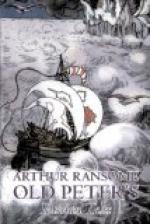“Very well,” says his brother, “I’ll come; but don’t think you can play any jokes on me.”
On the morning of the peasant’s name-day his brother, the merchant in the town, put on his best clothes, and his plump wife dressed in all her richest, and they got into their cart—a fine cart it was too, painted in the brightest colours—and off they drove together to the house of the brother who had once been poor. They took a basket of food with them, in case he had only been joking when he invited them to his name-day feast.
They drove to the village, and asked for him at the hut where he used to be.
An old man hobbling along the road answered them,—
“Oh, you mean our Ivan Ilyitch. Well, he does not live here any longer. Where have you been that you have not heard? His is the big new house on the hill. You can see it through the trees over there, where all these people are walking. He has a kind heart, he has, and riches have not spoiled it. He has invited the whole village to feast with him, because to-day is his name-day.”
“Riches!” thought the merchant; “a new house!” He was very much surprised, but as he drove along the road he was more surprised still. For he passed all the villagers on their way to the feast; and every one was talking of his brother, and how kind he was and how generous, and what a feast there was going to be, and how many barrels of mead and, wine had been taken up to the house. All the folk were hurrying along the road licking their lips, each one going faster than the other so as to be sure not to miss any of the good things.
The rich brother from the town drove with his wife into the courtyard of the fine new house. And there on the steps was the peasant brother, Ivan Ilyitch, and his wife, receiving their guests. And if the rich brother was well dressed, the peasant was better dressed; and if the rich brother’s wife was in her fine clothes, the peasant’s wife fairly glittered—what with the gold braid on her bosom and the shining silver in her hair.
And the peasant brother kissed his brother from the town on both cheeks, and gave him and his wife the best places at the table. He fed them—ah, how he fed them!—with little red slips of smoked salmon, and beetroot soup with cream, and slabs of sturgeon, and meats of three or four kinds, and game and sweetmeats of the best. There never was such a feast—no, not even at the wedding of a Tzar. And as for drink, there were red wine and white wine, and beer and mead in great barrels, and everywhere the peasant went about among his guests, filling glasses and seeing that their plates were kept piled with the foods each one liked best.
And the rich brother wondered and wondered, and at last he could wait no longer, and he took his brother aside and said,—
“I am delighted to see you so rich. But tell me, I beg you, how it was that all this good fortune came to you.”




